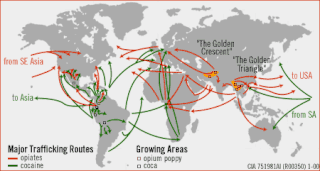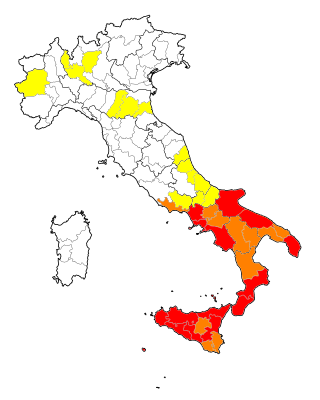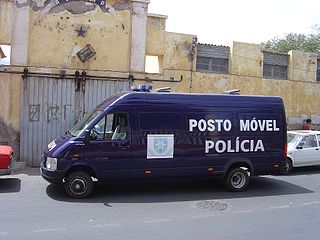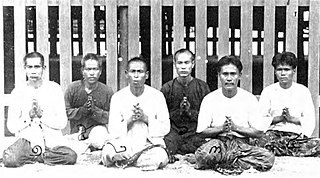Related Research Articles

Organized crime or organised crime is a category of transnational, national, or local group of centralized enterprises run to engage in illegal activity, most commonly for profit. While organized crime is generally thought of as a form of illegal business, some criminal organizations, such as terrorist groups, rebel forces, and separatists, are politically motivated. Many criminal organizations rely on fear or terror to achieve their goals or aims as well as to maintain control within the organization and may adopt tactics commonly used by authoritarian regimes to maintain power. Some forms of organized crime simply exist to cater towards demand of illegal goods in a state or to facilitate trade of goods and services that may have been banned by a state. Sometimes, criminal organizations force people to do business with them, such as when a gang extorts protection money from shopkeepers. Street gangs may often be deemed organized crime groups or, under stricter definitions of organized crime, may become disciplined enough to be considered organized. A criminal organization can also be referred to as an outfit, a gang, crime family, mafia, mob, (crime) ring, or syndicate; the network, subculture, and community of criminals involved in organized crime may be referred to as the underworld or gangland. Sociologists sometimes specifically distinguish a "mafia" as a type of organized crime group that specializes in the supply of extra-legal protection and quasi-law enforcement. Academic studies of the original "Mafia", the Italian Mafia generated an economic study of organized crime groups and exerted great influence on studies of the Russian mafia, the Chinese triads, the Hong Kong triads, and the Japanese yakuza.

The illegal drug trade, drug trafficking, or narcotrafficking is a global black market dedicated to the cultivation, manufacture, distribution and sale of prohibited drugs. Most jurisdictions prohibit trade, except under license, of many types of drugs through the use of drug prohibition laws. The think tank Global Financial Integrity's Transnational Crime and the Developing World report estimates the size of the global illicit drug market between US$426 and US$652 billion in 2014 alone. With a world GDP of US$78 trillion in the same year, the illegal drug trade may be estimated as nearly 1% of total global trade. Consumption of illegal drugs is widespread globally, and it remains very difficult for local authorities to reduce the rates of drug consumption.

Criminal organizations have been prevalent in Italy, especially in the southern part of the country, for centuries and have affected the social and economic life of many Italian regions since at least the 19th century. There are six major native mafia-like organizations that are heavily active in Italy. The oldest and most powerful of these organizations, having begun to develop between 1500 and 1800, are the 'Ndrangheta from Calabria, the Cosa Nostra from Sicily, and the Camorra based in Campania. In addition to these three long-established organizations, there are also three other significantly active organized crime syndicates in Italy that were founded in the 20th century: the Stidda of Sicily and the Sacra Corona Unita and Società foggiana, both from Apulia.
Albanian mafia or Albanian organized crime are the general terms used for criminal organizations based in Albania or composed of ethnic Albanians. Albanian organized crime is active in Europe, North America, South America, and various other parts of the world including the Middle East and Asia. The Albanian Mafia participates in a diverse range of criminal enterprises including trafficking in drugs, arms, and humans. Thanks to their close ties with the 'Ndrangheta of Calabria, they control a large part of the billion dollar wholesale cocaine market in Europe and appear to be the primary distributors of cocaine in various European drug hubs including London. Albanian organized crime is characterized by diversified criminal enterprises which, in their complexity, demonstrate a very high criminal capacity. In Albania, there are over 15 mafia families that control organized crime. According to some sources, Albania is the first European narco state.
Organised crime in Nigeria includes activities by fraudsters, bandits, drug traffickers and racketeers, which have spread across Western Africa. Nigerian criminal gangs rose to prominence in the 1980s, owing much to the globalisation of the world's economies and the high level of lawlessness and corruption in the country.
Gangs in Canada are mostly present in the major urban areas of Canada, although their activities are not confined to large cities.
Despite a reportedly low crime rate in China, crime still occurs in various forms. The Chinese government does not release exact unified statistics on crime rates and the rate of criminal offending due to such information being considered politically sensitive. Scarce official statistics released are the subject of much academic debate due to allegations of statistical fabrication, under-reporting and corruption. The illegal drug trade in China is a significant driver of violent crime, including murder.

Petty theft and burglary are common in Cape Verde, especially in crowded areas, such as market places, festivals, and celebrations. Often the perpetrators of these crimes are gangs of street children. As of 2008, local police statistics reflect an increase in crime in Cape Verde, particularly in the cities of Praia and Mindelo.
The 14K (十四K) is a triad group based in Hong Kong but active internationally. It is the second largest triad group in the world with around 20,000 members split into thirty subgroups. They are the main rival of the Sun Yee On, which is the largest triad.
Rates of crime in Guatemala are very high. An average of 101 murders per week were reported in 2018. The countries with the highest crime and violence rates in Central America are El Salvador and Honduras. In the 1990s Guatemala had four cities feature in Latin America's top ten cities by murder rate: Escuintla, Izabal (127), Santa Rosa Cuilapa (111) and Guatemala City (101). According to New Yorker magazine, in 2009, "fewer civilians were reported killed in the war zone of Iraq than were shot, stabbed, or beaten to death in Guatemala," and 97% of homicides "remain unsolved." Much of the violent nature of Guatemalan society stems back to a 36-year-long civil war However, not only has violence maintained its presence in the post-war context of the country following the Guatemalan Civil War, but it has extended to broader social and economic forms of violence.

Crime in Montenegro is combated by the Montenegro Police and other agencies.

Crime in Germany is handled by the German police forces and other agencies.
Organized crime in the Netherlands, sometimes called penose is the organised criminal underbelly in Amsterdam and other major cities. Penose usually means the organizations formed by criminals of Dutch descent. It is a slang word coming from the old Amsterdam Bargoens language.

A triad is a Chinese transnational organized crime syndicate based in Greater China with outposts in various countries having significant Chinese diaspora populations.
Turkish mafia is the general term for criminal organizations based in Turkey and/or composed of (former) Turkish citizens. Crime groups with origins in Turkey are active throughout Western Europe and less so in the Middle East. Turkish criminal groups participate in a wide range of criminal activities, internationally the most important being drug trafficking, especially heroin. In the trafficking of heroin they cooperate with Bulgarian mafia groups who transport the heroin further to countries such as Italy. Recently however, Turkish mafia groups have also stepped up in the cocaine trafficking world by directly participating in the massive cocaine smuggling pipeline that runs transnationally from South America to Europe. They allegedly have a lucrative partnership with the Venezuelan drug-trafficking organization known as the Cartel of the Suns who ships them cocaine along with criminal elements from Ecuador. Turkish organized crime has pushed into less traditional cocaine markets as well such as into Eastern Europe, the Caucasus, and the wealthy petro-states of the Persian Gulf. Cosa Nostra and the Turkish mafia are also known to be extremely close. Criminal activities such as the trafficking of other types of drugs, illegal gambling, human trafficking, prostitution or extortion are committed in Turkey itself as well as European countries with a sizeable Turkish community such as Germany, Netherlands, Belgium, Albania, and the United Kingdom.
British firms are organised crime groups originating in the United Kingdom.
The Greek mafia is the colloquial term used to refer to various organized crime elements originating from Greece. Indigenous organized criminal groups are well-entrenched in the largest Greek urban centers, particularly in Athens.
The Ukrainian mafia is a type of criminal organization with origins in Ukraine. Such organizations are regarded as one of the most influential types of organized crime coming out of the former USSR, including also the Russian mafia, the Georgian mafia, the Chechen mafia, the Armenian mafia and the Azerbaijani mafia. Ukrainian criminal organizations are involved in a significant number of illegal activities. Although Ukrainian criminal organizations are for the most part independently operating enterprises, they are sometimes connected with Russian mafia organizations, such as the case with Semyon Mogilevich.
Lebanese mafia is a colloquial term for organised crime groups which originate from Lebanon. Lebanese organised crime is active in the country of Lebanon itself, as well as in countries and areas with a large Lebanese community, most notably Australia, Germany and Canada also in the Triple Frontier in South America. Lebanese organised crime syndicates generally are active globally, largely due to the mass Lebanese population. For the past decades the Lebanese crime families had controlled 7,8% of Germany's underworld activities.
Maritime drug trafficking in Latin America is the primary mean of transportation of illegal drugs produced in this region to global consumer markets. Cocaine is the primary illegal drug smuggled through maritime routes because all of its cultivation and production is settled in the Andean region of South America.
References
- ↑ "Cape Verde And Drug Trafficking: A Major Challenge To Rule Of Law - Analysis". Eurasia Review. Archived from the original on 11 November 2014. Retrieved 17 January 2015.
- ↑ "Dorchester Reporter, Dorchester MA USA". dotnews.com. Archived from the original on 4 March 2016. Retrieved 17 January 2015.
- ↑ "Archived copy" (PDF). Archived from the original (PDF) on 2016-03-04. Retrieved 2015-01-17.
{{cite web}}: CS1 maint: archived copy as title (link) - ↑ "Archives - lesoir.be". lesoir.be. Retrieved 17 January 2015.
- ↑ "Athus : découverte du corps d'un homme tué par balles". lavenir.net. Retrieved 17 January 2015.
- ↑ Gérard Davet et Elise Vincent. "Les bandes sous la loupe des RG". Le Monde.fr. Retrieved 17 January 2015.
- ↑ Le Point, magazine. "L'or blanc des Blacks des cités". lepoint.fr. Archived from the original on 26 December 2014. Retrieved 17 January 2015.
- ↑ "Liquidaties voorkomen door arrestatie drugsbende". Elsevier. Archived from the original on 4 March 2016. Retrieved 17 January 2015.
- ↑ Buyways. "De Rotterdamse cafémoorden". Panorama. Archived from the original on 4 March 2016. Retrieved 17 January 2015.
- ↑ "Bloedig drama met veel vraagtekens". AD. Retrieved 17 January 2015.
- ↑ Nations, United (2010). The Globalization of Crime. United Nations Office on Drugs and Crime. ISBN 9789211302950 . Retrieved 17 January 2015– via google.be.
- ↑ "Alternativa Portugal". alternativaportugal.org. Archived from the original on 28 February 2015. Retrieved 17 January 2015.
- ↑ letemps. "LeTemps.ch -". Archived from the original on 28 May 2010. Retrieved 17 January 2015.
- ↑ letemps. "LeTemps.ch -". Archived from the original on 1 June 2010. Retrieved 17 January 2015.
- ↑ "PoliceGrantsHelp". policegrantshelp.com. Archived from the original on 5 March 2016. Retrieved 17 January 2015.
- ↑ "Alleged members of violent Dorchester street gang arrested during early morning Boston police raids". Boston.com. Retrieved 17 January 2015.
- ↑ Chutchian, Maria (27 October 2009). "Dorchester gang member sentenced for '03 shootings that left 2 dead - The Boston Globe". boston.com. Retrieved 17 January 2015.
- ↑ "Key gang figure gets life term - The Boston Globe". BostonGlobe.com. Archived from the original on 2014-01-03. Retrieved 2022-01-19.
- ↑ Growing up in Gangland bostonmagazine.com May 2006 [ dead link ]
- ↑ "30 arrested in early morning gang raids across Dorchester". dotnews.com. Retrieved 17 January 2015.
- ↑ "USDOJ: US Attorney's Office - District of Rhode Island". justice.gov. Retrieved 17 January 2015.